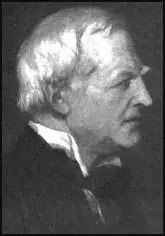Robert Lowe

Robert Lowe was born in Bingham, Nottinghamshire in 1811. Educated at Winchester and University College, Oxford, he was called to the bar in 1842.
Lowe emigrated to Australia but after developing a successful law practice he returned to England in 1850. Two years later he took office under Lord Aberdeen. In 1859 Lord Palmerston appointed Robert Lowe as Vice President of the Education Board.
A Royal Commission chaired by the Duke of Newcastle, investigated the rising level of public expenditure on education. Newcastle's report, published in 1861, recommended that public money for education be continued, but suggested that such support should be dependent upon a system of "payment by results".
Lowe accepted the main points of Newcastle Commission and in 1862 announced a Revised Code for Education. In future schools could claim 4s a year for each pupil with a satisfactory attendance record. An additional 8s was paid if the pupil passed examinations in reading, writing and arithmetic. Lowe pointed out that this system would help protect the public money being spent on education. As he said in the House of Commons: "If it is not cheap, it shall be efficient, if it is not efficient, it shall be cheap."
Every year Her Majesty's Inspectors (HMIs) visited each school to test pupils in reading, writing and arithmetic. Teachers, whose salaries normally depended on the size of the grant, were tempted to change their approach to education. In many schools, teachers concentrated exclusively on preparing the children for the yearly HMI visit.
Following the 1868 General Election, the Prime Minister, William Gladstone, made Robert Lowe Chancellor of the Exchequer. In 1873 Gladstone moved Lowe to the post of Home Secretary.
In 1880 Lowe was created Viscount Sherbrooke and served the Liberal Party in the House of Lords. Robert Lowe died in 1892.
